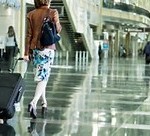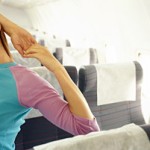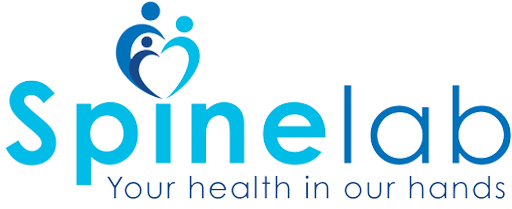 Traveling for business or pleasure is a normal part of life. Some of us do it more than others, but the ill effects of travel on your health can be the same. Travel is a commonly overlooked cause of lower back pain.
Traveling for business or pleasure is a normal part of life. Some of us do it more than others, but the ill effects of travel on your health can be the same. Travel is a commonly overlooked cause of lower back pain.
Air travel in particular can be hazardous to your spinal health due to prolonged slouching in a confined space for several hours followed by dragging your suitcase through airport terminals. Sitting in airplane seats compresses the discs between your vertebrae and can increase any underlying or pre-existing spinal pain. However, don’t be so quick to let cars off the hook if you are driving to your destination. Driving involves long hours of inactivity in a seated position exacerbated by poor roadway conditions jarring your body. The last thing you want on your trip is to not be able to enjoy yourself because of back pain. Fortunately you can prepare yourself for the arduous journey ahead and take proactive steps to prevent back pain and other related conditions. Whether it is a short trip or a long haul here are some tried and tested stay healthy travel tips.
Frequent movement is critical for prevention of pain. First move well; then move often. When flying try to get up and move every hour. Take a walk up and down the aisle to increase blood circulation in your legs. This helps prevent aching and soreness in your calves and reduces the risk of Deep Vein Thrombosis, or (DVT), an extremely painful condition where a blood clot forms in a vein deep in the calf when blood thickens and clumps together. Due to prolonged sitting you weaken the stability of your core abdominals which support the spine. Core weakness inhibits the optimal function of your hips and buttock muscles because you have a loss of central stability. Frequent contraction of your abdominal and buttock muscles will build a central foundation of strength reducing the risk of injury.
There are very simple ways to engage your abdominals and buttocks while traveling.
Hands Over Head
Raise your hands over your head and press your palms together with light pressure for 5-seconds. You can do this movement standing or sitting. The reason this works? Whenever you out your hands over your head it forces your spine into extension (backwards bending). The abdominals function as anti-extension muscles. Your brain ‘fires’ the abdominal muscles to prevent too much extension. This simple manoeuvre always works the core because it is a neurological response that is natural for the movement. Meaning, you don’t have to think about working the muscle it just happens automatically. Pressing the hands together at the end of the movement contracts the muscles further, while also waking up your upper back muscles that are tired from slouching. If you are driving alone, wait until you stop to perform this movement.
standing or sitting. The reason this works? Whenever you out your hands over your head it forces your spine into extension (backwards bending). The abdominals function as anti-extension muscles. Your brain ‘fires’ the abdominal muscles to prevent too much extension. This simple manoeuvre always works the core because it is a neurological response that is natural for the movement. Meaning, you don’t have to think about working the muscle it just happens automatically. Pressing the hands together at the end of the movement contracts the muscles further, while also waking up your upper back muscles that are tired from slouching. If you are driving alone, wait until you stop to perform this movement.
Mini-Reverse Lunge
Your buttock muscles go to sleep when sitting all the time. They develop what’s known as ‘glute amnesia.’ Buttock muscles forget what to do and when to do it. Waking up and turning back on the buttock is a must in preventing lower back pain. If you don’t use your buttock muscles for support your brain finds the support in your lower back. Simply stated, you overuse your back because it’s trying to do its job plus your buttocks responsibilities. It gets tired! And when it gets tired it hurts!
Stand with both legs together. Take a slight step backwards while squeezing the buttock on the backwards leg. Hold position for a count of 6 and repeat 5 times per side. The action of stepping backwards fires the buttock muscles and the isometric contraction help sustain the movement. Remember to breathe.
Breathing
Breathing sets the benchmark for core stability and neck strength. Most people have dysfunctional breathing where they inhale and exhale using too much of their chest and lungs as opposed to the diaphragm. Your diaphragm is an inner core muscle that contributes to intra-abdominal pressure IAP. Chest breathers use their anterior neck muscles and upper shoulders too much and this pattern contributes to reduced overuse fatigue threshold. Belly breathing is a powerful way to relax the body. Put one hands on your chest and one on your abdomen. Take a deep breath in through your nose and make the bottom hands move before the top hand. In essence you are inflating your abdomen like a balloon. If your chest hand moves first that means you are breathing with your chest too much. Breathe this way for 3 minutes.
Stop and Move
Take time to move your body in unusual ways to stimulate energy. The next time you make a road stop try these moves and see how you feel.
Hop up and down for 30 seconds on the balls of your feet. You only need to come off the ground a ½ or less. This gets blood rushing from the lower half of your body to the top half. Breathing and heart rate increases delivering much needed oxygen to tight and restricted muscle tissue starving for nutrients.
Cross Body X’s mimic crawling patterns in a standing position. This movement pattern ignites neural pathways in the body. One of the most powerful exercises you can do for waking up every muscle is cross midline of the body touching hand to opposite knee. Put your hands over your head and bring opposite knee to opposite hand in front of the body. Put hand back over head and repeat on the other side for twenty five repetitions.
Five Quick Tips:
- Pack ice gel packs/over the counter to alleviate soreness.
- Bring neck or lower back support pillows
- Drink plenty of water to hydrate your body. Proper hydration reduces inflammation
- Wear support belts for your lower back and calves to prevent stagnant blood flow
- Bring a golf ball to roll on the bottom of your foot (when not driving of course). This acupressure technique stimulates blood flow, nerve energy, and decreases soft tissue tightness.
Travel does not have to be as stressful or painful. If you plan well, execute well and take care of our body while in transit… the trip can be painless. And what better way to relax on vacation or arrive on business after travel, than stress free and pain free!
For more information on how best to look after your health & back when travelling contact SpineLab on 020 8905 4440 or email info@spinelab.co.uk
Acknowledgments to Perry Nickelston, DC, FMS, SFMA
